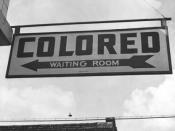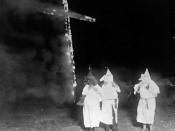The 12 year-time period after the Civil War (1865-1867), also know as Reconstruction, marked the time of progress for African Americans' legal rights. Although the major goals (reuniting the Confederate and Union states and granting blacks civil rights) of the Radical Republicans reconstruction plans succeeded, they weren't completed to their full potential, thus resulting in blacks still at a disadvantage socially and economically. Black Codes, Jim Crow laws, the Ku Klux Klan, and the shady methods to prevent African Americans from voting are several examples of how Reconstruction was a disgrace to the American Heritage and in no way radical.
Though the Civil Acts of 1866 was established to allow African Americans to be recognized as US citizens, the 13th, 14th, and 15th amendments failed to address the rights of the blacks in the areas of property holding, voting rights, and protection under the law; basically, African Americans' equality socially and economically were not yet granted.
Thus, black codes were created in the South (legally) to "keep blacks in their place", (pg 493 of American Pageant book) that is, inferior to whites and to continue the suppression of blacks without actually enslaving them. Under the black codes, African Americans were deprived of the rights the white citizens had. These source documents displays how blacks still did not have the same rights as white citizens.
"Sec. 1. Be it ordained by the police jury of the parish of St. Landry, That no negro shall be allowed to pass within the limits of said parish without special permit in writing from his employer. Whoever shall violate this provision shall pay a fine of two dollars and fifty cents, or in default thereof shall be forced to work four days on the public road, or suffer corporeal punishment as provided hereinafter.


